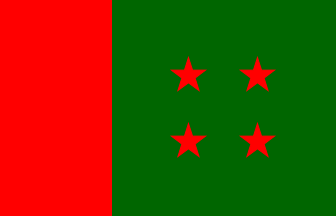Biography of Sheikh Hasina

Biography of Sheikh Hasina
Sheikh Hasina was born on 28th September, 1947 in Tungipara, a remote village under Gopalganj district, which is also the birthplace of the Father of the Nation Bangabandhu Sheikh Mujibur Rahman. She is the eldest daughter of
Bangabandhu Sheikh Mujibur Rahman. Her mother Begum Fazilatunnesa was widely respected as a tender-hearted lady and for her love for the poor and needy people. In 1968, Sheikh Hasina married an eminent scientist of Bangladesh, Dr. M.A. Wazed Miah. They are now the parents of a son and a daughter. After her marriage, Sheikh Hasina continued her studies and graduated from the University of Dhaka in 1973. Scion of a political family, she was actively involved in students politics in her college and university life. She gathered political experience in her role as the go-between in maintaining contact between her father and the political and student leaders during Sheikh Mujibur Rahman's repeated imprisonment by the Pakistani rulers in the 1960s. Always popular among students, Sheikh Hasina, as president of Govt. Intermediate Girls College unit of the Chhatra League, i.e., the students wing of the Awami League, was also elected Chief of the Student Union in 1966. She
was an active member of the Students League of Dhaka University and Secretary of the Student League unit of Rokeya Hall. She actively participated in the mass movement of 1969, and at the time of the War of Liberation in 1971, she was
imprisoned by the Pakistan occupation army along with other members of her family.
On the fateful night of August 15, 1975 some power hungry and bloodthirsty army officers assassinated the Father of the Nation who was also the elected Head of State, Bangabandhu Sheikh Mujibur Rahman, his wife, three sons and all the
residents of his house. Sheikh Hasina and her only sister Sheikh Rehana survived the carnage as they were then visiting West Germany. Sheikh Hasina was forced to live in exile because of the restrictions put on her by General Ziaur Rahman, the President
of Bangladesh at the time. However, in 1981, she was elected President of the largest political party of Bangladesh, and no force could prevent her return to Bangladesh on 17 May 1981. On her return, she was heartily welcomed by millions
of people who were eagerly waiting for the return of the daughter of democracy, Sheikh Hasina. Sheikh Hasina is the first Prime Minister of Bangladesh to have succeeded in leading the ordinary masses to the threshold of political power. Governments have come and gone since the cowardly assassination of Sheikh Mujibur Rahman in 1975, but the toiling masses who form the bulk of the population of Bangladesh were always kept at bay in exercise of the power of the state. They were used as vassals by successive military dictators, but were never taken into
confidence. They were used as showpieces to the donors in the dictators' bid to get foreign aid and assistance. When aid came, the dictators and their hand-picked few plundered most of it. Poverty continued in its endemic form.
Even the elected government of the BNP led by the then Prime Minister Begum Khaleda Zia followed the same legacy of defiance and stubbornness that her husband General Ziaur Rahman and his most trusted Second-in-Command General
Ershad had left in the body politic of Bangladesh. They exercised power first, to perpetuate their lust for authority and personal gains, and secondly, to keep the people of the country as far away as possible from the citadel of power.
The Elections on June 12, 1996 were an outcome of the vigorous and uncompromising political movement of the people led by Sheikh Hasina and her party which gave the people the chance to choose from among those who represent the power of the people, and not those who epitomise the military oligarchy.
On June 13, 1996 the Awami League won the elections. Sheikh Hasina was sworn in as the Prime Minister of the People's Republic of Bangladesh, the nation her father Sheikh Mujibur Rahman had founded 25 years ago.
Time and again Sheikh Hasina has spoken candidly about her foremost political objective. She said, "We shall continue our struggle and our movement until such time as the economic emancipation of the poor is attained. The exploitation of
the poor, who are in a vast majority in our society, by the rich, who are in a minority, must come to an end."
After securing for the people their right to vote freely and fairly through the establishment of a non-party caretaker government, Sheikh Hasina has committed herself to secure their right to food and freedom from hunger and is on record
to have done so. Bangladesh Awami League

